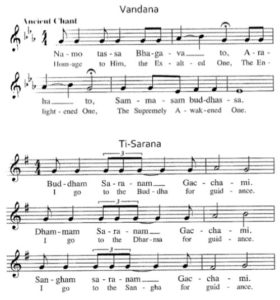Each Sunday Family Service typically follows the same sequence.
Service starts at 9:00 am. Members begin to gather in the main temple at 8:45 am. There is a buzz of conversations as members greet each other and settle in for the service.
At 9:00 am, the KANSHO (the ringing of the temple bell) is sounded. The sound of the bell calls to everyone to prepare for the service. The bell is struck 7 times, then followed by a series of soft fast beats that slows down into a crescendo and then returns from slow to soft fast beats. This series is followed by 5 strokes and again the lead up to a crescendo and back down again. The sound of the calling bell then ends with 3 strikes. The numbers 7, 5, and 3 are significant numbers in Japanese Buddhist culture. They are of such ancient origin that their exact meaning has been lost.
After the KANSHO has sounded, the MASTER OF CEREMONIES opens the service with INTRODUCTORY REMARKS.

Following the opening, the minister leads the Sangha in the VANDANA AND TISARANA. The VANDANA is ancient chant that praises the Buddha. In the chant of the TISARANA, we take refuge in the THREE TREASUES (the Buddha, the Dharma, and the Sangha). The VANDANA and TISARANA are both sung Pali (the language of the ancient Buddhist scriptures) and in English.
The CHANTING OF ONE OF SUTRAS follows the VANDANA and TISARANA. The SUTRAS are poetic discourses that teach us the Dharma. The SUTRAS may be chanted in Japanese or in English.
The Sangha’s offering of OSHOKO is an important part of a Jikoen Sunday Service. This is the part of the service in which each member attending the service offers incense at the altar. Oshoko is a personal and a community affair. It is a community affair in that members greet each other as they line up to offer incense. This act of congeniality reflects the Okinawan saying: ICHARIBA CHOODEE (Once we meet and talk, we are brothers and sisters). Oshoko is personal in that when each member places the incense in the burner and puts his/her hands together in gashho, recites NAMO AMIDA BUTSU, he/she spends a precious moment alone with Amida Buddha.
At this point, we sing a GATHA (a Buddhist “hymn”).
Then comes the highlight of the Service, the DHARMA MESSAGE delivered by Rev. Shindo Nishiyma. Jikoen is fortunate to have such wonderful speaker in Rev. Nishiyama. His messages can be humorous or serious but they are always on point and listener-friendly.
A second GATHA usually follows the Dharma Message.
As we close the Service, we do a group recitation of THE GOLDEN CHAIN OF LOVE or THE SHINSHU PLEDGE.
The Sangha then closes the service by singing the NEMBUTSU. The singing of NAMO AMIDA BUTSU is the opportunity for all present to experience the sweep and enormity of the great compassion that surrounds and embraces them.
After announcements are completed, all members head to Social Hall for refreshments.
At each seat there is a copy of the JODO SHINSHU SERVICE BOOK and a book of gathas, PRAISES OF THE BUDDHA. Laminated sheets of information and THE GOLD CHAIN OF LOVE are also available.
See Also
Weekly Family Service
The Jodo Shinshu Service on the Honpa Hongwanji Mission of Hawaii website
